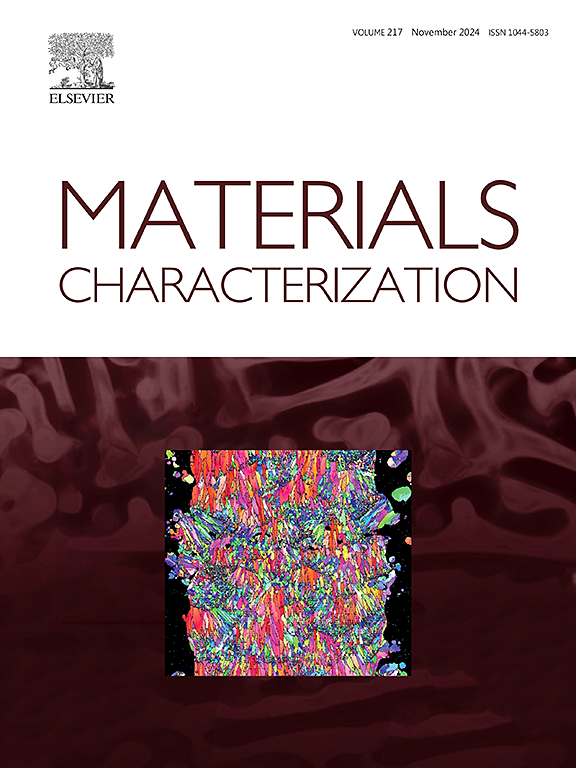Mo-Ni foam interlayer deposited pyrolytic carbon for brazing C/C and nickel-based superalloy
IF 4.8
2区 材料科学
Q1 MATERIALS SCIENCE, CHARACTERIZATION & TESTING
引用次数: 0
Abstract
C/C composites possess both lightweight and high-strength properties, and joining them with superalloys can reduce the mass of the joints and construct ultra-high heat flux lightweight cooling components, which are widely used in the hot end of a nuclear reactor. Nonetheless, significant residual stress caused by thermal mismatch is the counterpart when brazing C/C composites and metals. This increases the initiation of the joint cracks. In this study, a new method of deposition pyrolytic carbon (PyC) on the Mo-Ni skeleton to help braze C/C composites and nickel-based superalloys was proposed. With the protection of a uniformly distributed PyC layer, the corrosion and dissolution of the metal skeleton by the brazing material can be effectively mitigated. The low coefficient of thermal expansion (CTE) of the PyC layer mitigates the thermal mismatch of the joint, while the high plastic deformation capacity of the skeleton effectively mitigates the residual stresses. The two mechanisms cooperate to increase joint strength. To enhance the chemical bonding of the joint, a modification of Ti powder was implemented. The synergistic reinforcement of PyC-modified Mo-Ni foam (C-MN) and Ti powder-modified brazing material was utilized to effectively enhance the shear strength of the joint to ∼41 MPa, a 163 % improvement over unmodified joints. This work can provide a new idea for the preparation of high-performance C/C composites and joining materials for metals.
用于钎焊碳/碳和镍基超耐热合金的镍钼泡沫夹层沉积热解碳
C/C 复合材料具有轻质和高强度的特性,将其与超合金连接可减轻连接处的质量,并建造超高热通量的轻质冷却组件,这些组件被广泛应用于核反应堆的热端。然而,在将 C/C 复合材料与金属进行钎焊时,热不匹配会导致大量残余应力。这增加了接头裂纹的产生。本研究提出了一种在钼镍骨架上沉积热解碳(PyC)的新方法,以帮助钎焊碳/碳复合材料和镍基超合金。在均匀分布的 PyC 层的保护下,钎焊材料对金属骨架的腐蚀和溶解可以得到有效缓解。PyC 层的低热膨胀系数(CTE)可减轻接头的热失配,而骨架的高塑性变形能力可有效减轻残余应力。这两种机制相互配合,提高了连接强度。为了增强接合处的化学结合,对钛粉进行了改性。利用 PyC 改性钼镍泡沫(C-MN)和钛粉改性钎料的协同增强作用,有效地将接头的剪切强度提高到了 41 兆帕,比未改性接头提高了 163%。这项研究为制备高性能 C/C 复合材料和金属连接材料提供了新思路。
本文章由计算机程序翻译,如有差异,请以英文原文为准。
求助全文
约1分钟内获得全文
求助全文
来源期刊

Materials Characterization
工程技术-材料科学:表征与测试
CiteScore
7.60
自引率
8.50%
发文量
746
审稿时长
36 days
期刊介绍:
Materials Characterization features original articles and state-of-the-art reviews on theoretical and practical aspects of the structure and behaviour of materials.
The Journal focuses on all characterization techniques, including all forms of microscopy (light, electron, acoustic, etc.,) and analysis (especially microanalysis and surface analytical techniques). Developments in both this wide range of techniques and their application to the quantification of the microstructure of materials are essential facets of the Journal.
The Journal provides the Materials Scientist/Engineer with up-to-date information on many types of materials with an underlying theme of explaining the behavior of materials using novel approaches. Materials covered by the journal include:
Metals & Alloys
Ceramics
Nanomaterials
Biomedical materials
Optical materials
Composites
Natural Materials.
 求助内容:
求助内容: 应助结果提醒方式:
应助结果提醒方式:


